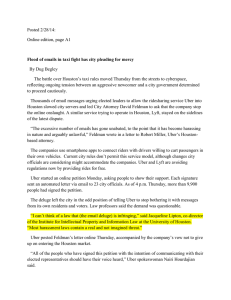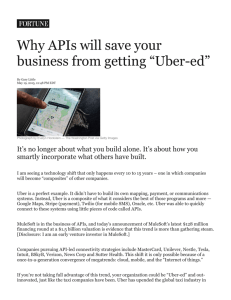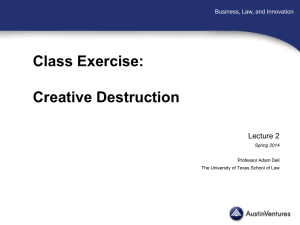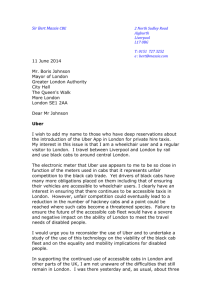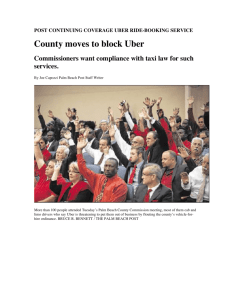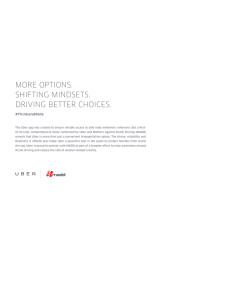Uber Important in the Sharing Economy
advertisement
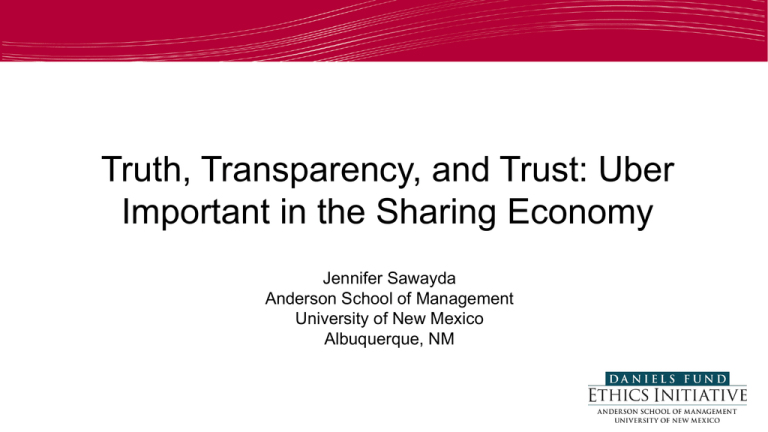
Truth, Transparency, and Trust: Uber Important in the Sharing Economy Jennifer Sawayda Anderson School of Management University of New Mexico Albuquerque, NM 1 What Is the Sharing Economy? • An economic model that involves the sharing of underutilized assets – Person-to-person or peer-to-peer (P2P) – Private individuals with an underutilized resource can “rent” this resource, essentially becoming his or her own entrepreneur – People rent rooms, cars, boats, beds, etc. directly from each other • Also known as collaborative consumption and piecemeal labor 2 Growth of the Sharing Economy • Most of these “sharing” firms were founded between 2008 and 2010 during the Great Recession – Economist article refers to it as “post-crisis antidote to materialism and overconsumption” • Even more traditional companies are investing in the sharing economy – Avis, GM, and Daimler all have stakes in sharing companies – The sharing economy has become a $26 billion industry 3 Examples • Airbnb: Lodging • Uber: Ride Sharing • Lyft: Ride Sharing – $333 million in venture financing • TaskRabbit: Chore Marketplace – Site matches client that requires a task to be done with someone who has experience in that area • Instacart: Grocery delivery • Others include Zilok (power tools), HomeAway (houses), Feastly (eat in dining rooms), DogVacay (dog watching), Boatbound (boats), Liquid (bicycles), LendingClub (loans), Fon (Wi-Fi) 4 Airbnb • Airbnb website founded in 2008 to connect travelers to those wanting to rent out their extra rooms • Connects travelers to lodgings in 34,000 cities in 190 countries • $1 billion in revenue; takes 3% commission for its services • Popularized the sharing economy concept • Advantage: Allows people to earn extra income from their lodgings, beds, and couches • Possible Disadvantage: Some critics claim it encourages owners of multiple properties to rent in short-term rather than converting to longterm residences, causing disruptions in urban housing 5 Uber • • • • • Founded in 2009 as a ride sharing service Uses a mobile app to connect drivers-for-hire with people who need a ride Expanded operations to 250 cities in over 57 countries $10 billion in revenue; $40 billion valuation Offers different services to target different markets – UberPop, UberPool, UberX (cheaper services), UberSUV, UberBlack and UberLux (luxury), UberRush (package deliveries) • Due to lack of regulation, some of Uber’s services are banned or suspended in South Korea, Germany, France, Netherlands, Taiwan 6 Advantages • Private individuals can essentially become their own bosses and rent out resources they are not using – Became an important way of generating income during recent economic uncertainty – Flexibility and chance to be “one’s own boss” • Ease of entry – It is very easy to enter this market; in fact, competition is quickly heating up, both globally and domestically – e.g. Uber competitors include Lyft, Get Taxi (Israel), Didi Kuaidi (China) • Convenience and cost savings for customers • Interpersonal connections between user and seller • Environmental benefits 7 Ethics Issues in the Sharing Economy • Regulatory Issues – How should these companies be regulated? Should they be taxed like incumbents such as hotels and taxi services? • Employees or Independent Contractors? • Control of companies over independent contractors – Depending upon the company, it can dictate terms such as fees that the contractors must abide by – They have the ability to implement changes – Policy changes can cause disruptions in demand • Safety Issues – Letting strangers use your stuff can be dangerous – Rape allegations involving Uber 8 Ethics Issues in the Sharing Economy • Stability of customers can tend to fluctuate • Culpability Issues – Many of these companies have insurance, but there have been criticisms that this insurance coverage and their terms are not enough – Three states have passed laws related to ride-sharing services putting liability on the car-sharing services and their insurers • Could this disempower workers in the long-term? – Labor activists claim these are not long-term jobs and puts employees too much under the control of the sharing companies and technology • Each sharing company comes with its own set of risks depending upon the industry and the company model 9 Ethics Issues with Uber • Employment – A California labor commissioner ruled that a driver was an employee because Uber is involved in “every aspect of the operation” – How flexible is Uber? It exerts certain controls over drivers that arguably could place them in a condition of employment – Uber may have to give up some of these controls – New contracts force drivers into arbitration for disputes • Surge pricing – Pricing can go up to 6-8 percent higher during peak periods – Uber claims it uses surge pricing to get more drivers out on the road during shortages – Criticized for using surge pricing during Australian hostage crisis 10 Ethical Issues with Uber cont. • Liability – After a girl was killed, Uber claimed it was not responsible because the driver was not en route or transporting a passenger before the accident • Safety – Rape charge in India • Ignoring bans – Despite bans in Queensland, Australia; New Delhi, India; Cape Town; and Taiwan, Uber services are still in operation there • Truthfulness of advertising – Uber ads have made it seem that rides are safe – There is the impression that fees for Uber rides are cheaper than taxis – While these can be true, critics claim that Uber does not have enough controls for safety, and rides are not always cheaper; hence, its advertising is misleading 11 Controls to Deal with Ethical Issues • Lyft: Allows drivers to rate riders so they can be on the lookout for “dangerous” characters • Airbnb: 24/7 hotline, trust and safety division, $1 million host guarantee • RelayRides: Check users’ driver records for violations but tends to rely more on user reviews • Uber: Refund money for surge pricing during emergencies, added a “safe ride” checklist, and created a team of safety and fraud experts 12 Conclusions • There is no doubt that the sharing economy depends on trust – Users must trust independent contractors to get the job done efficiently, safely, and effectively – Consumer distrust would have devastating impact on these firms • Are companies transparent enough about potential risks? Are they transparent with independent contractors about income potential and company involvement? – Past mishaps demonstrate that these companies could improve their transparency among consumers and drivers • As the sharing economy continues to evolve, companies are putting in more controls to mitigate risks and increase transparency 13 Sources • Airbnb, “About Us,” https://www.airbnb.com/about/about-us • “All Eyes on the Sharing Economy,” Economist, March 7, 2013, http://www.economist.com/news/technology-quarterly/21572914-collaborative-consumption-technology-makes-iteasier-people-rent-items • Rachel Botsman presentation, “The Shared Economy Lacks a Shared Definition,” Fast Company, November 21, 2013, http://www.fastcoexist.com/3022028/the-sharing-economy-lacks-ashared-definition • Case developed by Noushin Laila Ansari, Lecia Weber, Sederick Hood, Christian Otto, and Jennifer Sawayda, “Uber Technologies Inc: Managing Opportunities and Challenges,” UNM Daniels Fund Ethics Initiative, http://danielsethics.mgt.unm.edu/pdf/uber-case-study.pdf • Marco della Cava, “Airbnb Pushes Itself Further and Farther,” USA Today, August 20, 2015, 3B • Tomio Geron, “Airbnband the Unstoppable Rise of the Share Economy,” Forbes, January 23, 2013, http://www.forbes.com/sites/tomiogeron/2013/01/23/airbnb-and-the-unstoppablerise-of-the-share-economy/ • Eva GrantSimran Khosla, “Here’s everywhere Uber is banned around the world,” Business Insider, April 8, 2015, http://www.businessinsider.com/heres-everywhere-uber-is-bannedaround-the-world-2015-4 • John Harvey and Marcus Costello, “Sharing Not Always Caring: Problems with the ‘Sharing Economy’,” Ethics Centre, http://www.ethics.org.au/On-Ethics/Our-articles/April-2015%281%29/Sharing-not-always-caring-problems-with-the-%E2%80%98shari • Christine Lagorio-Chafkin, “Brian Chesky, Joe Gebbia, and Nathan Blecharczyk, Founders of Airbnb,” Inc., July 19, 2010, http://www.inc.com/30under30/2010/profile-brian-chesky-joegebbia-nathan-blecharczyk-airbnb.html • Eric Newcomer, “Airbnb Overhauls Service for Business Travelers,” Bloomberg, July 20, 2015, http://www.bloomberg.com/news/articles/2015-07-20/airbnb-overhauls-service-forbusiness-travelers • “Pioneers of the Shared Economy,” Forbes, http://www.forbes.com/pictures/eeji45emgkh/airbnb-snapgoods-and-12-more-pioneers-of-the-share-economy/ • “The Rise of the Sharing Economy,” The Economist, May 9, 2013, http://www.economist.com/news/leaders/21573104-internet-everything-hire-rise-sharing-economy • Natasha Singer, “In the Sharing Economy, Workers Find Both Freedom and Uncertainty,” The New York Times, August 16, 2014, http://www.nytimes.com/2014/08/17/technology/inthe-sharing-economy-workers-find-both-freedom-and-uncertainty.html?_r=1 • Jason Tanz, “How Airbnb and Lyft Finally Got Americans to Trust Each Other,” Wired, April 23, 2014, http://www.wired.com/2014/04/trust-in-the-share-economy/ 14

